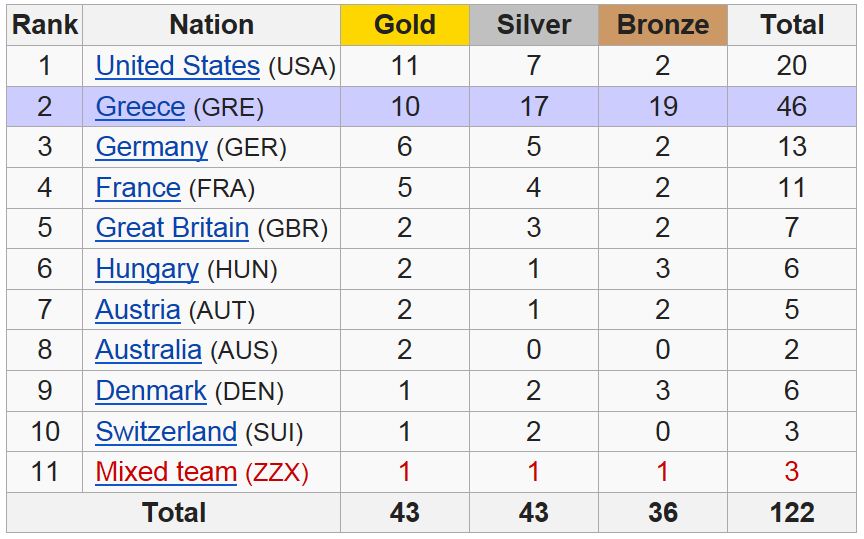Originally posted on 4 Nov 2010 :
In an idle reverie, I went through the history of Olympic games.The first ‘modern’ Olympics were held in Athens, in 1896. It isinteresting to see the manner in which they were conducted and how ‘technology’has seeped into the sport arena over the last hundred years. Some of the thingswhich struck me are given below. For those who are interested in details, maysurf the net.
The winner of the 400 meters ran the distance in 54.2 seconds.KD Singh of our course did better than that in 1960 in the NDA!
EXCERPTS FROM THE ACCOUNT OF THE SUMMER OLYMPICS 1896
Athletics
The athletics events had the most international field of any of the sports. The major highlight was the marathon, held for the first time in international competition. Spiridon Louis, a previously unrecognized water carrier, won the event to become the only Greek athletics champion and a national hero. Although Greece had been favored to win the discus and the shotput, the best Greek athletes finished just behind the American Robert Garrett in both events.[3]
The curves of the track were very tight, making fast times in the running events virtually impossible. Despite this, Thomas Burke,of the United States, won the 100meter race in 12.0seconds and the 400meter race in 54.2seconds. Burke was the only one who used the”crouch start” (putting his knee on soil), confusing the jury.Eventually, he was allowed to start from this “un comfortable position”.[29]
Shooting
Main article: Shooting at the 1896 Summer Olympics
Held at a rangeat Kallithea,the shooting competition consisted of five events—two using a rifle and three with the pistol.The first event, themilitary rifle, was won by Pantelis Karasevdas,the only competitor to hit the target with all of his shots. The second event,for military pistols, was dominated bytwo American brothers: John and SumnerPaine became thefirst siblings to finish first and second in the same event. In order to avoid embarrassingtheir hosts, the brothers decided that only one of them would compete in thenext pistol event, the freepistol. Sumner Paine wonthat event, thereby becoming the first relative of an Olympic champion tobecome Olympic champion himself.[34]
The Paine brothers did not compete in the 25 meter pistol event,as the event judges determined that their weapons were not of the requiredcaliber. In their absence, Ioannis Phrangoudis won.The final event, the freerifle, began on the sameday. However, the event could not be completed due to darkness and was finalizedthe next morning, when Georgios Orphanidis wascrowned the champion.[34]
Swimming
Alfréd Hajós, thefirst Olympic champion in swimming, is one of only two Olympians to have won medals in both sport and art competitions.
Theswimming competition was held in the open sea because the organizers had refusedto spend the money necessary for a specially constructed stadium.Nearly 20,000 spectators lined the Bay ofZea off the Piraeus coastto watch the events. The water in the bay was cold, and the competitorssuffered during their races. There were three open events (men’s 100 metre freestyle, men’s500 metre freestyle,andmen’s 1200 metre freestyle), in addition toa specialevent open only to Greek sailors,all of which were held on the same day (April 11).[31]
For Alfréd Hajós of Hungary,this meant he could only compete in two of the events, as they were held tooclose together, which made it impossible for him to adequately recuperate.Nevertheless, he won the two events in which he swam, the 100 and 1200meter freestyle.Hajós later became one of only two Olympians to win a medal in both theathletic and artistic competitions,when he won a silver medal for architecture in 1924. The 500 meter freestylewas won by Austrian swimmer Paul Neumann,who defeated his opponents by more than a minute and a half.
Weightlifting
Launceston Elliot,winner of the one-armed weightlifting event, was popular with the Greekaudience, who found him very handsome.
The sport of weightliftingwas still young in 1896, and the rules differed from those in use today.Competitions were held outdoors, in the infield of the main stadium,and there were no weight limits. The first event was held in a style now knownas the “clean and jerk”.Two competitors stood out: Scotsman LauncestonElliot and ViggoJensen of Denmark.Both of them lifted the same weight; but the jury, with Prince George as thechairman, ruled that Jensen had done so in a better style. The Britishdelegation, unfamiliar with this tie-breaking rule, lodged a protest. Thelifters were eventually allowed to make further attempts, but neither lifter improved,and Jensen was declared the champion.[36]
Elliotgot his revenge in the onehand lift event,which was held immediately after the two-handed one.Jensen had been slightly injured during his last two-handed attempt, and was nomatch for Elliot, who won the competition easily. The Greek audience wascharmed by the Scottish victor, whom they considered very attractive. A curiousincident occurred during the weightlifting event: a servant was ordered toremove the weights, which appeared to be a difficult task for him. PrinceGeorge came to his assistance; he picked up the weight and threw it aconsiderable distance with ease, to the delight of the crowd.[36]
Wrestling
Carl Schuhmann (left)and Georgios Tsitas shake hands before the final match of the wrestlingcompetition.
No weight classes existed for the wrestling competition,held in the Panathinaiko Stadium, which meant that there would only be onewinner among competitors of all sizes. The rules used were similar tomodern Greco-Roman wrestling,although there was no time limit, and not all leg holds were forbidden (incontrast to current rules).
Apart from the twoGreek contestants, all the competitors had previously been active in othersports. Weightlifting champion Launceston Elliot faced gymnastics champion CarlSchuhmann. The latter won and advanced into the final, where he met GeorgiosTsitas, who had previouslydefeatedStephanosChristopoulos. Darkness forced the final match to be abandoned after40 minutes; it was continued the following day, when Schuhmann needed only a quarterof an hour to finish the bout.[37]







